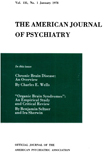Auditory evoked potentials and selective attention in formerly hyperactive adolescent boys
Abstract
Although many of the prominent symptoms of minimal brain dysfunction (MBD) subside during pubescence, adolescents who had MBD during childhood may have persistent neuropsychological dysfunctions. The authors studied the auditory average cortical evoked potentials and behavioral responses of 9 formerly hyperactive adolescent boys and 9 matched control subjects who performed a selective attention task. Experimental subjects showed indications of impairment on both electrophysiological and behavioral measures of selective attention. Although the findings are consistent with a neurodevelopmental lag interpretation of MBD, they may also imply a persistent dysfunction related to the frontal association cortex.
Access content
To read the fulltext, please use one of the options below to sign in or purchase access.- Personal login
- Institutional Login
- Sign in via OpenAthens
- Register for access
-
Please login/register if you wish to pair your device and check access availability.
Not a subscriber?
PsychiatryOnline subscription options offer access to the DSM-5 library, books, journals, CME, and patient resources. This all-in-one virtual library provides psychiatrists and mental health professionals with key resources for diagnosis, treatment, research, and professional development.
Need more help? PsychiatryOnline Customer Service may be reached by emailing [email protected] or by calling 800-368-5777 (in the U.S.) or 703-907-7322 (outside the U.S.).



